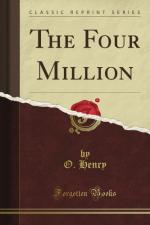“When one loves one’s Art no service seems too hard,” said Delia.
“Magister praised the sky in that sketch I made in the park,” said Joe. “And Tinkle gave me permission to hang two of them in his window. I may sell one if the right kind of a moneyed idiot sees them.”
“I’m sure you will,” said Delia, sweetly. “And now let’s be thankful for Gen. Pinkney and this veal roast.”
During all of the next week the Larrabees had an early breakfast. Joe was enthusiastic about some morning-effect sketches he was doing in Central Park, and Delia packed him off breakfasted, coddled, praised and kissed at 7 o’clock. Art is an engaging mistress. It was most times 7 o’clock when he returned in the evening.
At the end of the week Delia, sweetly proud but languid, triumphantly tossed three five-dollar bills on the 8x10 (inches) centre table of the 8x10 (feet) flat parlour.
“Sometimes,” she said, a little wearily, “Clementina tries me. I’m afraid she doesn’t practise enough, and I have to tell her the same things so often. And then she always dresses entirely in white, and that does get monotonous. But Gen. Pinkney is the dearest old man! I wish you could know him, Joe. He comes in sometimes when I am with Clementina at the piano—he is a widower, you know—and stands there pulling his white goatee. ’And how are the semiquavers and the demisemiquavers progressing?’ he always asks.
“I wish you could see the wainscoting in that drawing-room, Joe! And those Astrakhan rug portieres. And Clementina has such a funny little cough. I hope she is stronger than she looks. Oh, I really am getting attached to her, she is so gentle and high bred. Gen. Pinkney’s brother was once Minister to Bolivia.”
And then Joe, with the air of a Monte Cristo, drew forth a ten, a five, a two and a one—all legal tender notes—and laid them beside Delia’s earnings.
“Sold that watercolour of the obelisk to a man from Peoria,” he announced overwhelmingly.
“Don’t joke with me,” said Delia, “not from Peoria!”
“All the way. I wish you could see him, Dele. Fat man with a woollen muffler and a quill toothpick. He saw the sketch in Tinkle’s window and thought it was a windmill at first. He was game, though, and bought it anyhow. He ordered another—an oil sketch of the Lackawanna freight depot—to take back with him. Music lessons! Oh, I guess Art is still in it.”
“I’m so glad you’ve kept on,” said Delia, heartily. “You’re bound to win, dear. Thirty-three dollars! We never had so much to spend before. We’ll have oysters to-night.”
“And filet mignon with champignons,” said Joe. “Where is the olive fork?”
On the next Saturday evening Joe reached home first. He spread his $18 on the parlour table and washed what seemed to be a great deal of dark paint from his hands.
Half an hour later Delia arrived, her right hand tied up in a shapeless bundle of wraps and bandages.




